This post may contain affiliate links. Please read my privacy policy.
Nasi Lemak – This iconic Malaysian dish is all about that fragrant coconut milk rice, topped with crispy anchovies, spicy sambal, hard-boiled eggs, roasted peanuts, and fresh cucumber. It’s the most authentic and delicious nasi lemak recipe you’ll ever try!
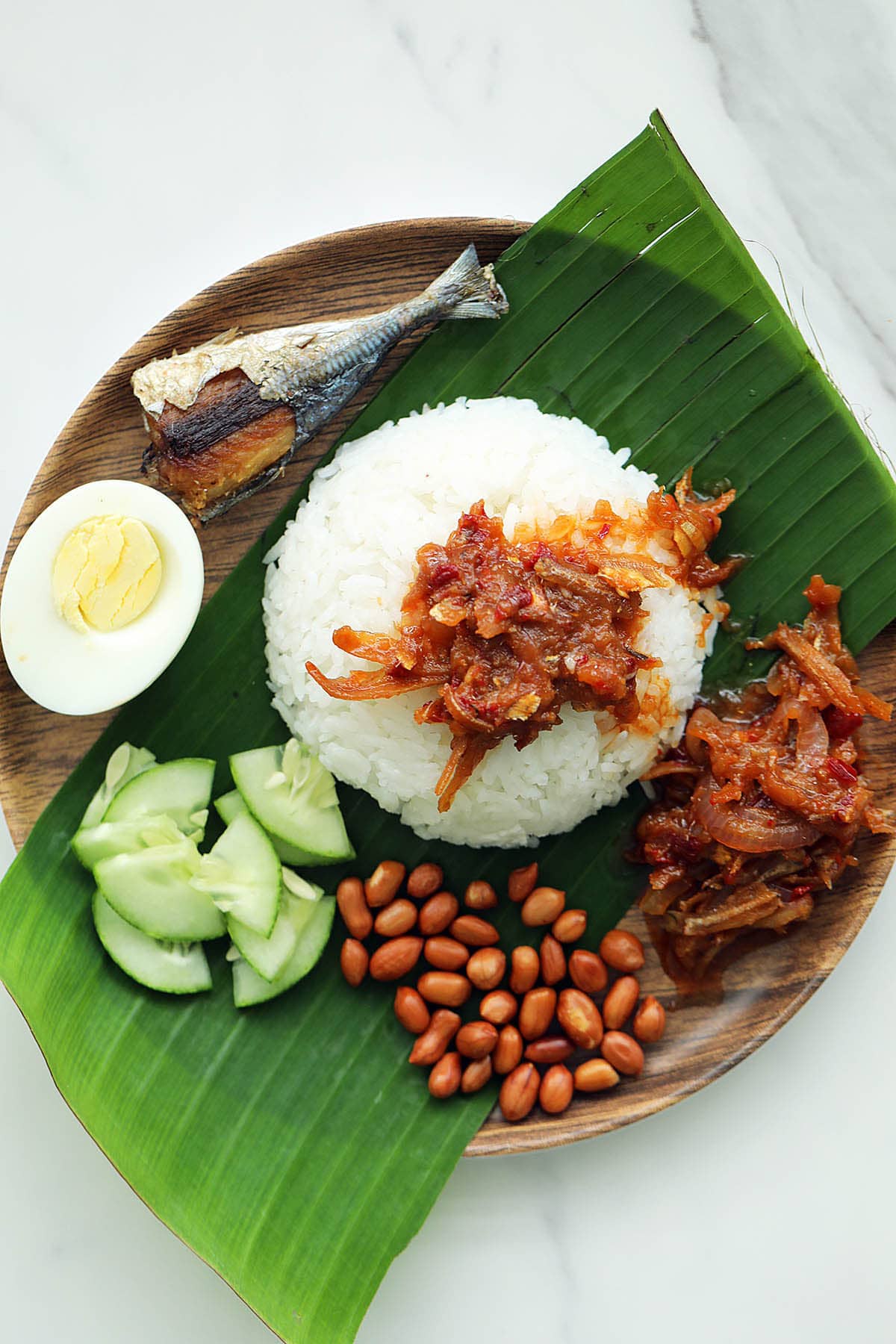
Authentic Nasi Lemak Recipe
Nasi Lemak is, without a doubt, the de facto national dish of Malaysia. It literally means “fat rice,” and it’s one of the most popular dishes, loved and enjoyed by Malaysians of all ethnicities, races, and origins. It’s such an iconic dish that even the Central Intelligence Agency (CIA) of the United States recently took notice, as reported by The Star newspaper in Malaysia.
For me, a good nasi lemak recipe isn’t something to be taken lightly. It needs to have amazing quality, texture, flavors, and the right ingredients. The main ingredient? Sambal. Sambal is the soul of the dish; it ties all the components together and completes it perfectly.
Traditionally, nasi lemak is wrapped in a banana leaf and shaped into a triangular cone, called bungkus in Malay. At home, I like to serve it on a sheet of banana leaf, placing the rice right on top. The warmth of the steamed rice allows the banana leaf to release its earthy aroma into the rice, making the nasi lemak even more delicious and inviting.
Ingredients You’ll Need
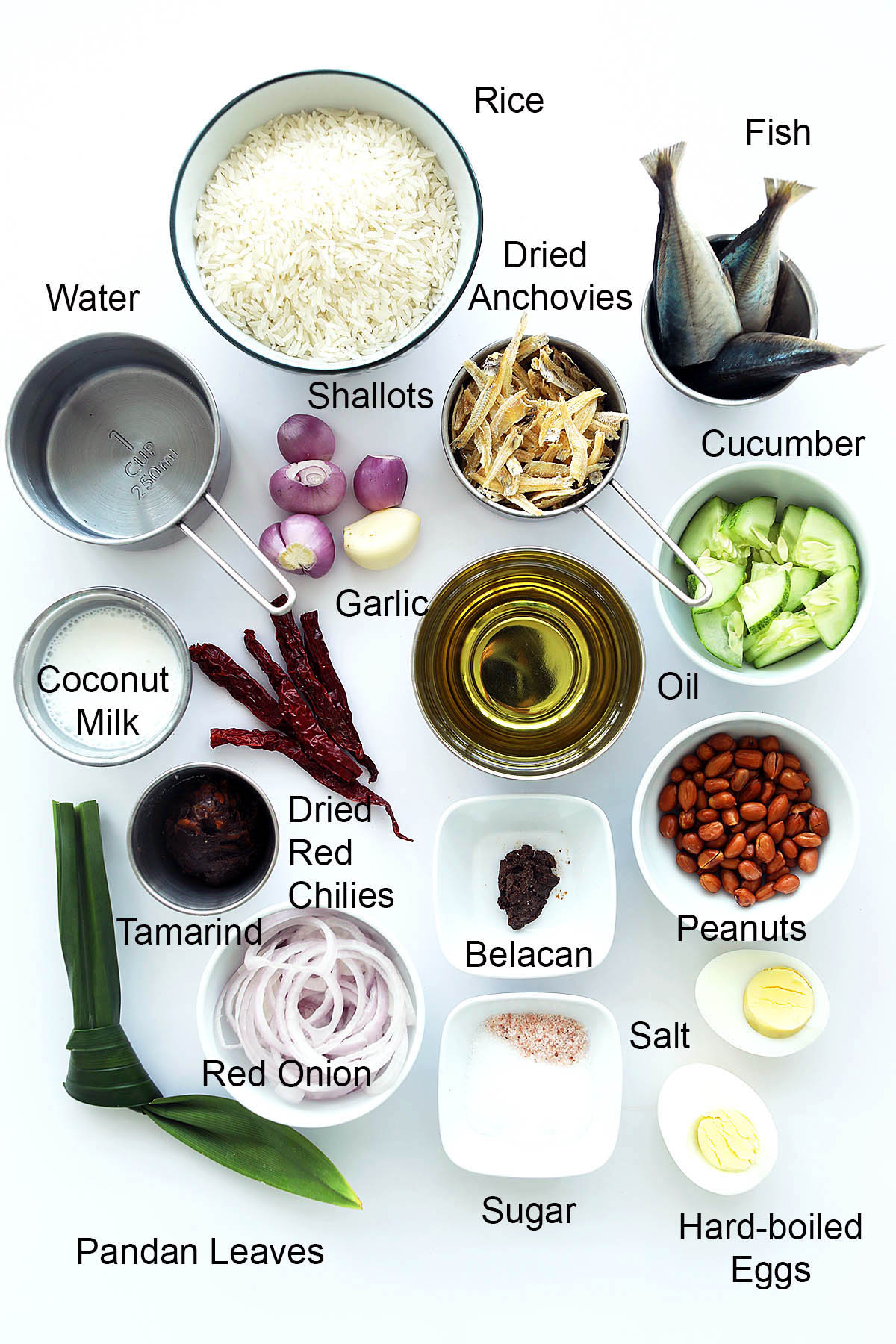
Nasi lemak typically includes fragrant coconut rice, served with a variety of accompaniments. Here’s a basic list of what goes into the recipe.
- Coconut Rice: Rice cooked with coconut milk, water, and pandan leaves, resulting in the sweet aroma of the nasi (rice).
- Sambal. Spice paste made from dried red chilies, shallots, garlic, and belacan (Malaysian prawn paste). Sambal is usually stir-fried with oil, along with onions and tamarind juice added for tanginess. Salt and sugar are used to balance the flavors.
- Dried anchovies or ikan bilis. Small dried anchovies fried until crispy, adding a salty crunch to the dish. In my recipe, I made sambal anchovies, but if you can’t find anchovies, feel free to swap them for Sambal Udang (spicy shrimp).
- Peanuts: Roasted peanuts, providing a nutty flavor and crunchy texture to the overall dish.
- Hard-boiled eggs.
- Cucumber: Sliced cucumber for a refreshing contrast to the spiciness of the sambal.
- Fish: Small fish such as mackerel or sardines are fried and served as an accompaniment to nasi lemak.
Please refer to the recipe card at the bottom of this post for full details on each ingredient.
Secret Ingredients Of Nasi Lemak
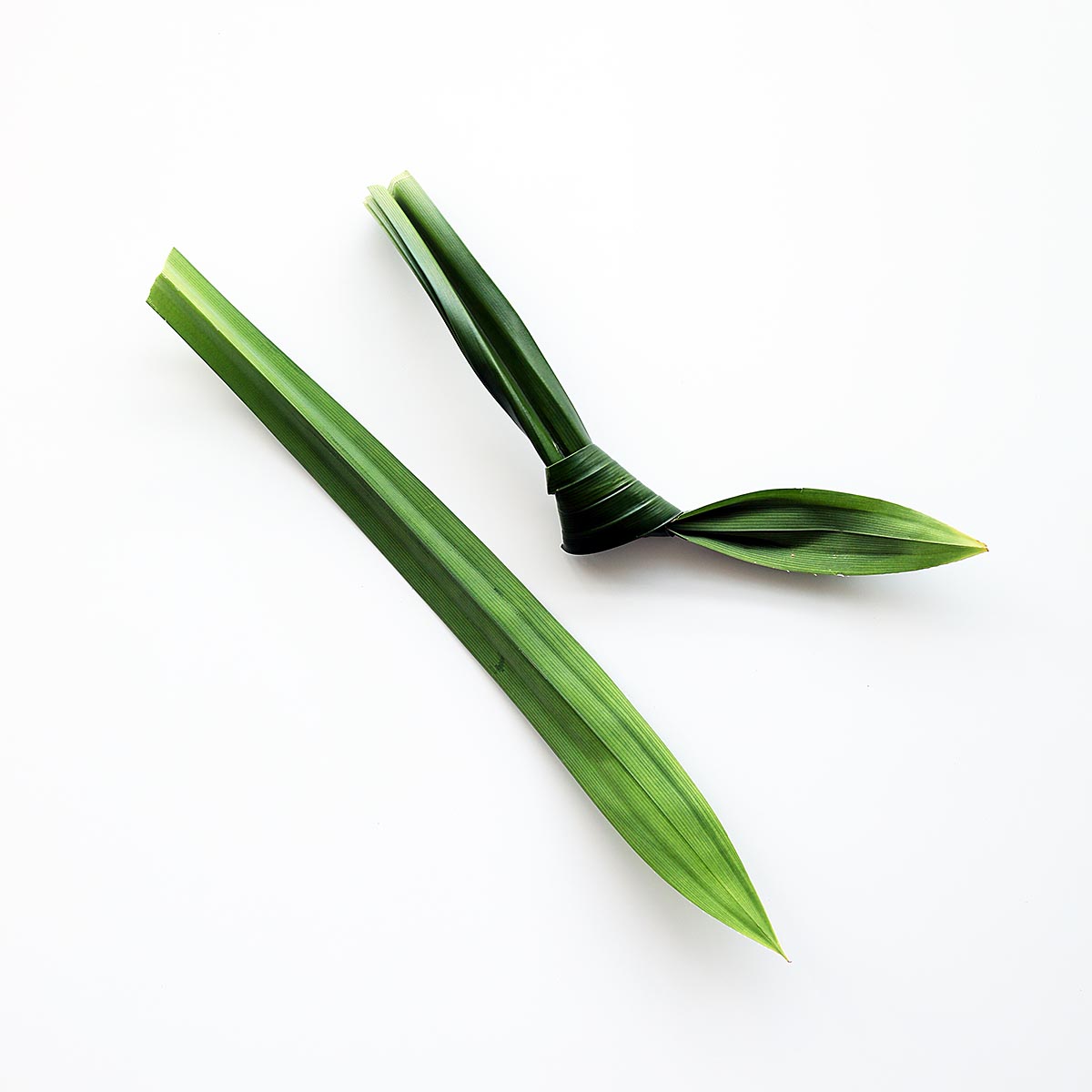
Pandan leaves or screwpine leaves is the secret ingredient. The leaves are highly fragrant with floral smell. They are used in many Malaysian recipes. Another ingredient is coconut milk, which is used to make the coconut rice.
This dish will not be authentic without the pandan leaves and coconut milk. In fact, you can’t serve it with plain steamed rice.
How To Make Nasi Lemak
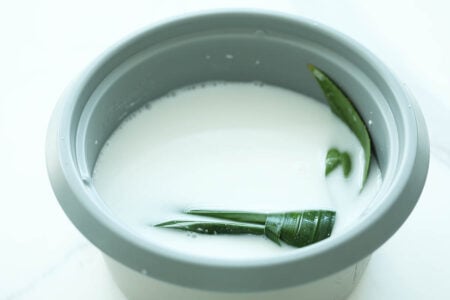
Okay, first, let’s make the coconut rice! Start by rinsing the rice under running water a few times—just keep swishing it around until the water runs clear. Once it’s clean, drain it completely. Now, add 1 ½ cups of water, some coconut milk, and a pinch of salt to the rice. Toss in a couple of pandan leaves too—that’s what gives it that amazing fragrance. Cook the rice as you normally would, and once it’s done, just pull out the pandan leaves and toss them.
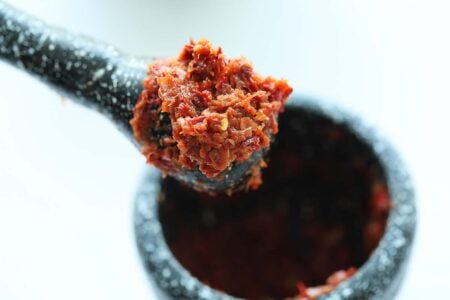
Next up is the spice paste! If you’ve got a mortar and pestle, throw in the shallots, garlic, dried chilies, and prawn paste, and start pounding away until it all comes together. If that sounds like too much work, no worries—you can just toss everything into a food processor and blitz it until it’s nice and smooth. Whatever works for you!
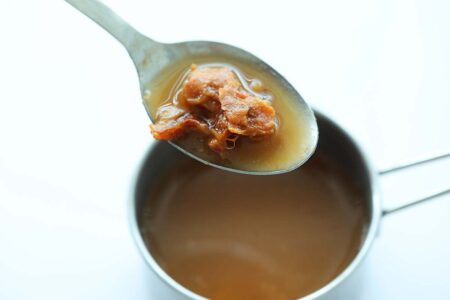
For the tamarind water, just soak the tamarind pulp in some water for about 15 minutes. Keep giving it a gentle squeeze to really get all the good stuff out of there. Once it’s done soaking, strain out the pulp, and you’ll be left with the tamarind juice.
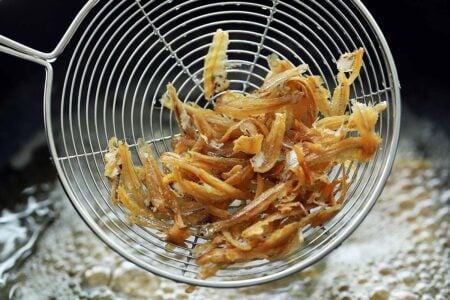
Time for the fried anchovies! Give them a quick rinse under cold tap water a few times, then let them drain. In a pan, heat about 2 cups of oil. Once it’s nice and hot, toss in the anchovies and fry them until they’re golden brown and crispy. Use a strainer to scoop them out and let them drain on a paper towel-lined plate. You can eat them on their own as a crunchy snack, or toss them into sambal to make sambal anchovies—so good!

For the sambal ikan bilis (sambal anchovies), heat 2 tablespoons of frying oil in a pan over medium to low heat. Add the spice paste and stir-fry until it’s nice and fragrant and turns a rich reddish color. Toss in some onion rings and the fried anchovies, then mix everything together really well. Now, pour in the tamarind juice, and season with salt and a bit of sugar. Let it simmer on low heat until the sauce thickens up. Once it’s done, just set it aside.
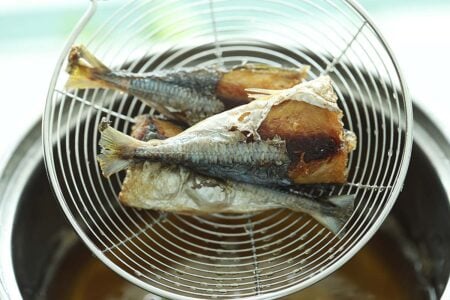
Let’s fry up some fish! First, clean the small fish and give them a good sprinkle of salt. Then, heat up the rest of that frying oil in your pan and deep fry the fish until they’re nice and crispy.
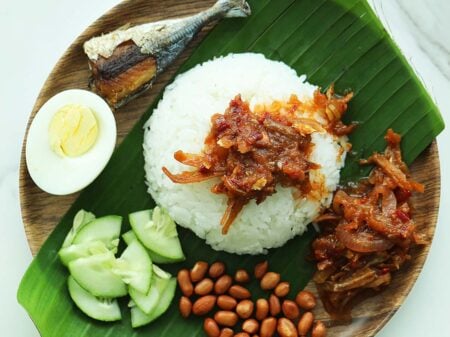
Time to assemble your nasi lemak! Grab a small bowl of the coconut rice you made earlier and carefully place it in the center of a plate lined with a banana leaf—if you’ve got one! Then, arrange the fried fish, a couple of tablespoons of sambal, roasted peanuts, some cucumber slices, and a hard-boiled egg around the rice. You can even spoon some sambal right on top of the rice if you like it extra spicy! Serve it up right away while it’s nice and fresh—so delicious!
Frequently Asked Questions
Yes, absolutely. The coconut rice is made of rice, coconut milk and water. For the side dishes and accompaniments, you can serve it with vegetarian version of sambal (without belacan), hard-boiled eggs, vegetable acar and tempeh!
Nasi Lemak is a Malaysian dish. It’s the de-facto national dish of Malaysia. The dish can be found in Singapore, but with different side dishes such as fried ham and sausages, which are certainly not the authentic version of the dish.
I used dried red chili Arbol for the perfect balance of heat. Don’t use regular fresh chilies though, as they’ll affect the texture and flavor of the paste. If you can’t find Arbol chilies, feel free to swap with other dried red chilies, but keep in mind the heat level might differ a bit!
For sure! If you’re concerned about the spice level, you can definitely use less dried chilies. I’d suggest starting with half the amount and adjusting based on your taste. Keep in mind, though, that the chilies bring a lot of flavor, so you’ll still want some for that kick!
Yes, I do! I soak the de-seeded dried chilies in water for about 10-15 minutes until they soften up. This makes it easier to blend them into a smooth paste.
If you’re using tamarind concentrate instead of pulp, it’s super easy! Just mix about 1 tablespoon of tamarind concentrate with 3 tablespoons of water to get a similar flavor to tamarind pulp. You can always adjust it to your taste, as some concentrates might be stronger, so feel free to tweak it!
A serving of nasi lemak is only 338 calories. Fat rice is not that fat after all.
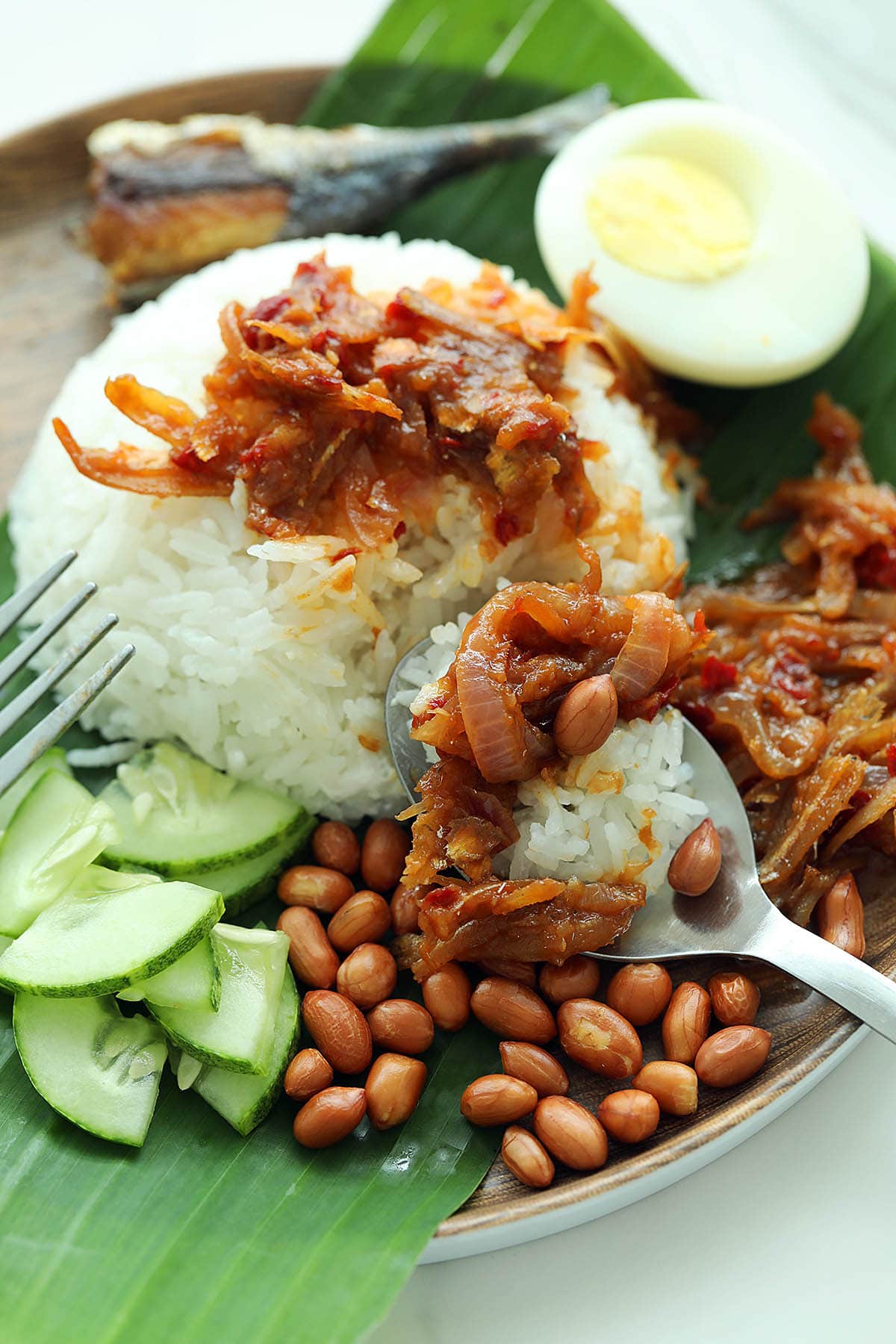
Side Dishes
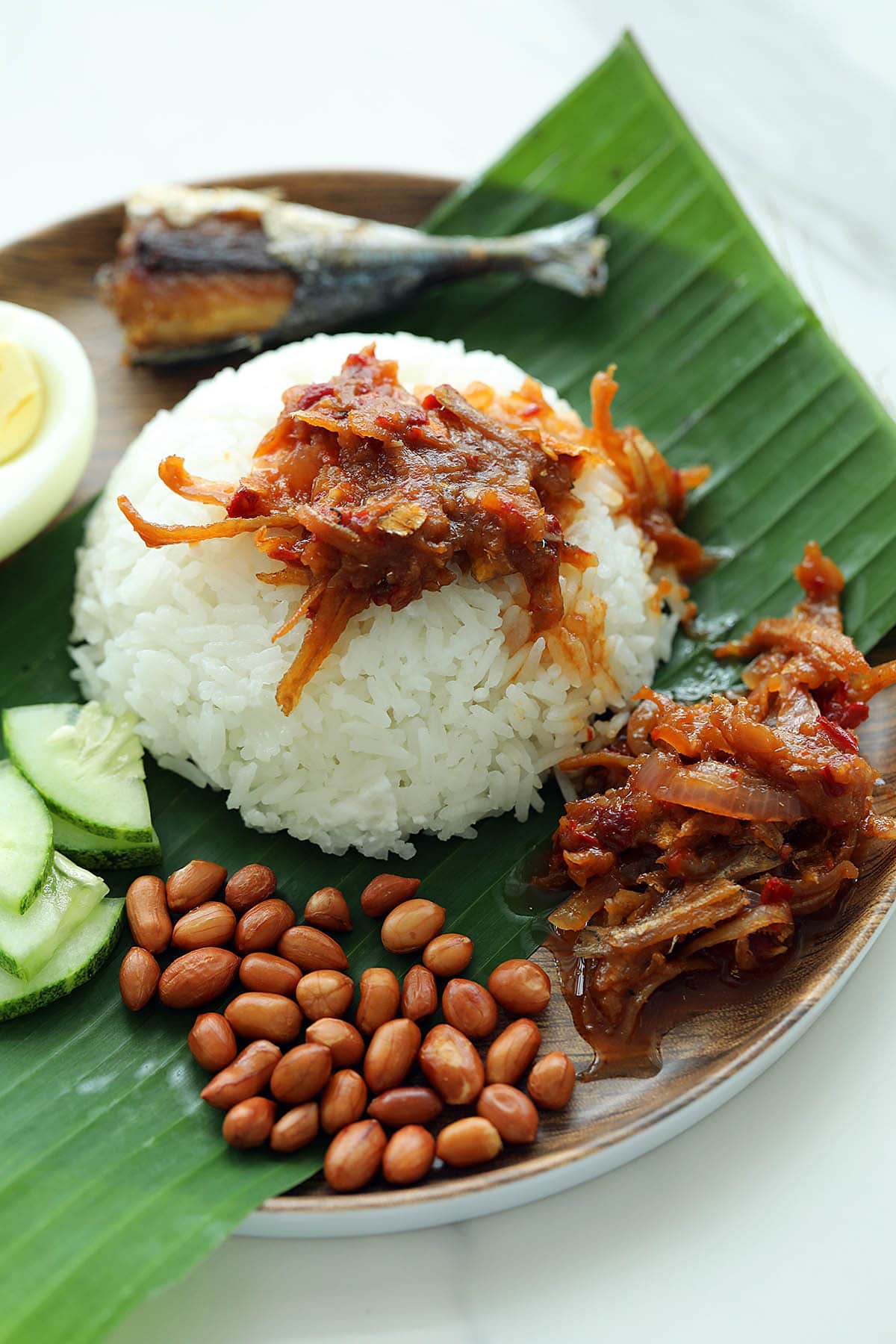
There are so many side dishes or extras I love pairing with nasi lemak: beef rendang, chicken rendang, or even Malaysian chicken curry. They turn it into a truly satisfying and substantial meal.
When I assemble my nasi lemak, I like to arrange my favorite sides on top of or around the coconut milk rice. The piping hot steamed coconut milk rice is best served on a sheet of banana leaf for that extra aroma. And if I’m in the mood for an extra spicy kick, I always add a dollop of sambal belacan as a condiment. It’s the perfect way to enjoy this dish!
What To Serve With Nasi Lemak
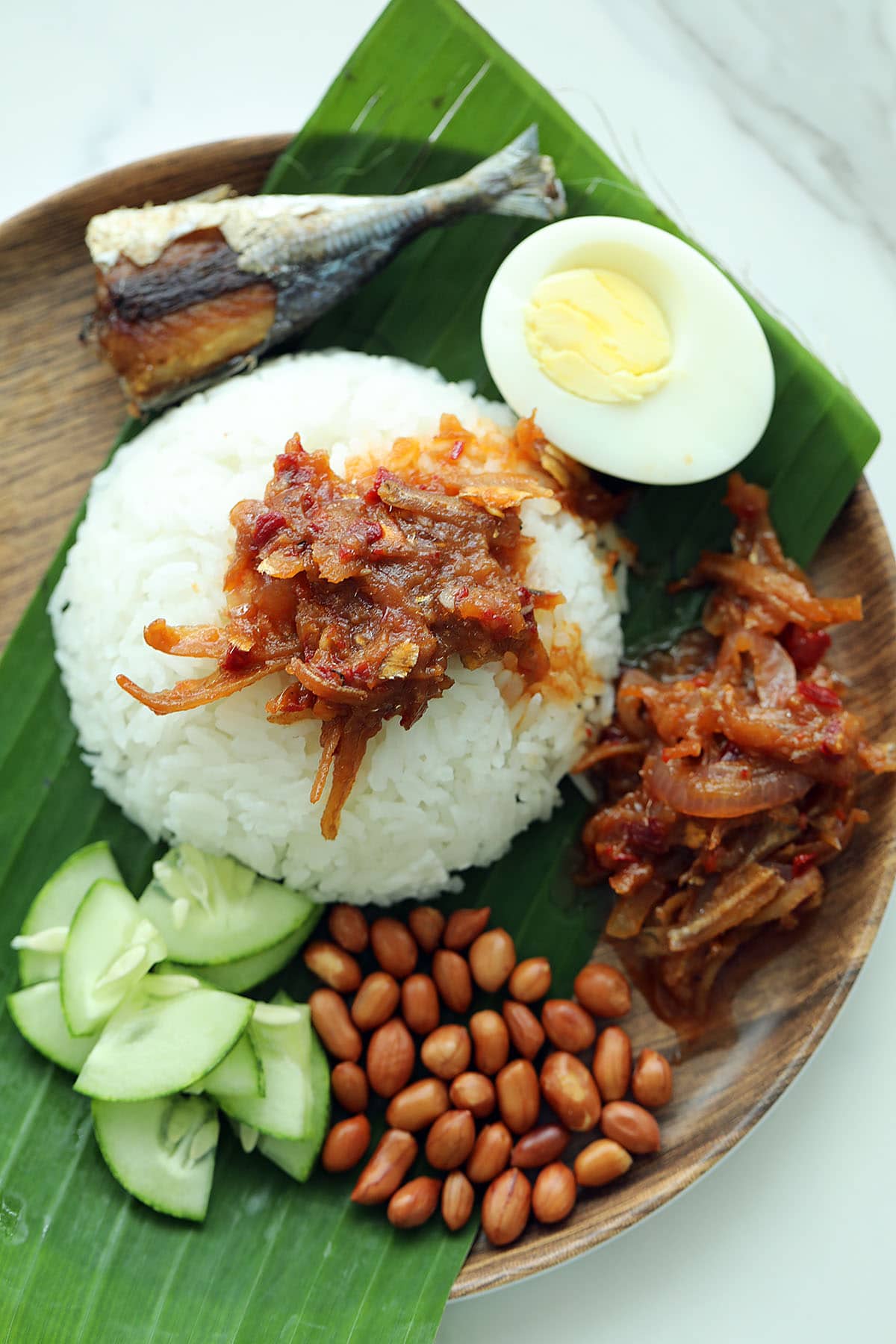
Serve them with the following Malaysian dishes for the best and most authentic nasi lemak. These recipes are personally developed by me; they are my favorites!
I hope you enjoy this post as much as I do. If you try my recipe, please leave a comment and consider giving it a 5-star rating. For more easy and delicious recipes, explore my Recipe Index, and stay updated by subscribing to my newsletter and following me on Facebook, Pinterest, and Instagram for new updates.
Other Malaysian Recipes You Might Like
- Chicken Rice
- Yam Rice
- Claypot Chicken Rice
- Nasi Ulam
- Mee Siam
- Penang Hokkien Mee
- Mee Goreng
- Soto Ayam
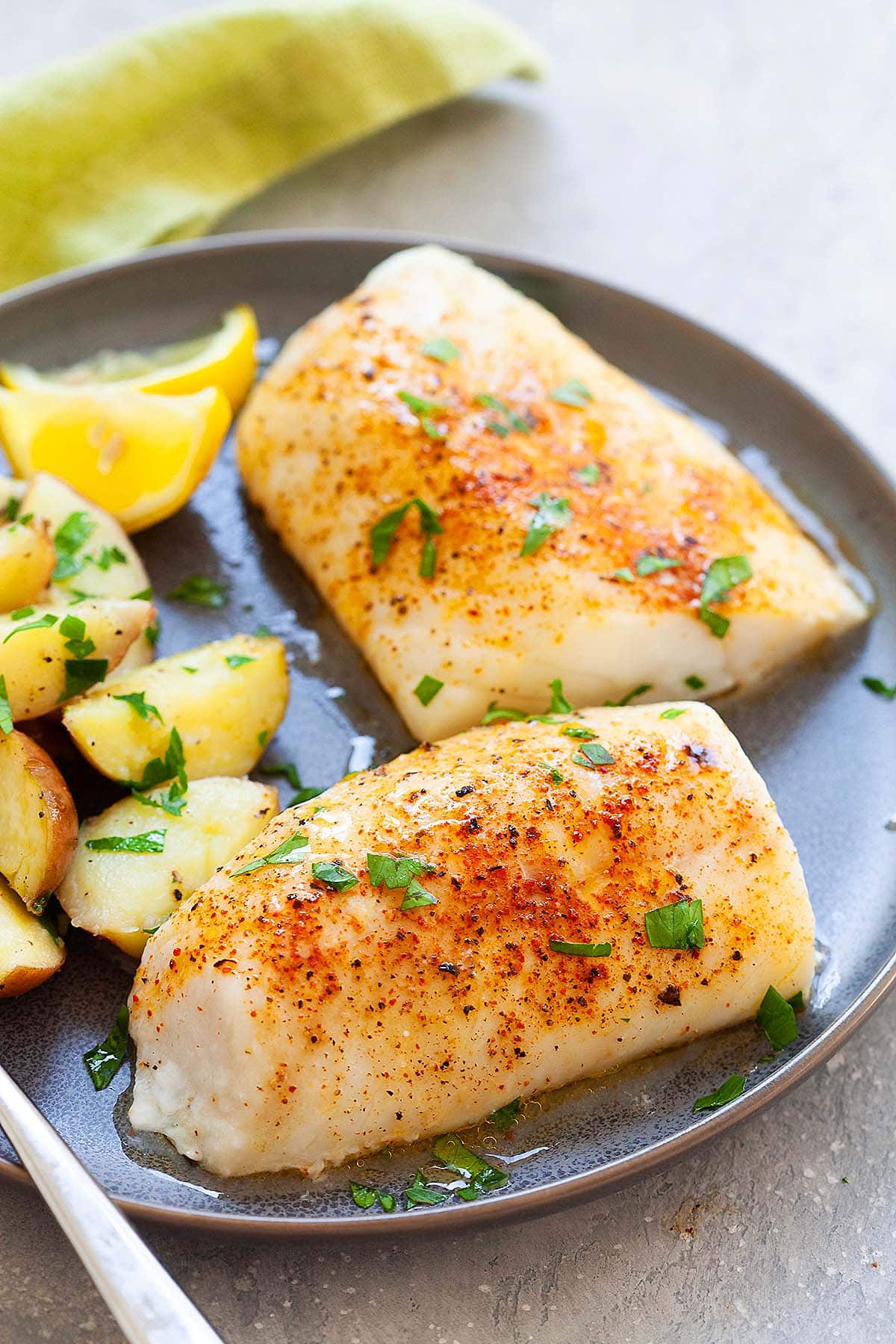
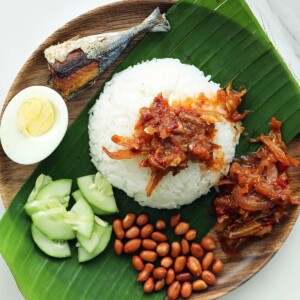
Nasi Lemak Recipe
Ingredients
Coconut Milk Steamed Rice
- 2 cups rice
- 1 ½ cups water, cut down to 1 1⁄4 cups if using ¾ cup coconut milk
- ½ cup coconut milk , use ¾ cup for creamier rice
- 1 teaspoon salt
- 3 pandan leaves, tie them into a knot
Spice Paste
- 4 shallots, peeled
- 1 clove garlic, peeled
- 8 medium length dried red chilies, seeded
- 1 teaspoon belacan, prawn paste
Tamarind Water
- 1 cup water
- tamarind pulp, size of a small ping pong ball
- salt, to taste
- 2 tablespoons sugar, or more to taste
Fried Anchovies
- 1 cup ikan bilis, dried anchovies, peeled
- 2 cups oil, for frying
- 1 red onion, peeled, sliced into rings
Other ingredients
- 3 small fish , sardines or mackerel, cut into halves
- 2 hard boiled eggs, cut into halves
- 1 cup roasted peanuts
- 1 small cucumber, cut into slices and then quartered
Instructions
- Coconut Rice. Rinse the rice with running tap water, repeating the process a few times until the water turns clear. Drain the water completely. Add 1 ½ cups of water to the washed rice, followed by the coconut milk and a pinch of salt. Add the pandan leaves into the rice and cook your rice. Discard the pandan leaves after rice is cooked.
- Spice Paste. Pound the shallots, garlic, dried chilies, and prawn paste with a mortar and pestle. Alternatively, you can grind them with a food processor.
- Tamarind Water. Soak the tamarind pulp in water for 15 minutes. Constantly squeeze the tamarind to extract its flavor into the water. Drain the pulp and save the tamarind juice.
- Fried Anchovies. Rinse the dried anchovies with tap water a few times and let them drain. Heat 2 cups of oil in a pan, fry the anchovies until they've become light brown and crispy. Remove from oil with a strainer and drain on a paper towel-lined plate. You can serve them as is, or add them into sambal to make sambal anchovies.
- Sambal Ikan Bilis (Sambal Anchovies). On medium to low heat, heat 2 tablespoons of frying oil in a pan. Stir-fry the spice paste until fragrant, turning reddish in color. Add the onion rings and fried anchovies, stirring well. Pour in the tamarind juice, salt, and sugar. Simmer on low heat until the sauce thickens. Set it aside.
- Fried Fish. Clean the small fish and season them with salt. Deep fry with the remaining frying oil.
- Assembling Nasi Lemak. To serve, scope out a small bowl of rice and place onto the center of a plate. Arrange the fried fish, hard boiled egg, roasted peanuts, and cucumber around the rice. Add 2 spoons of the sambal on top of the rice. Serve immediately.
Notes
- I used a rice cooker to make the coconut milk steamed rice. Caution: Note that some high-tech rice cookers do not allow oily contents in the rice bowl, and the rice cooker might break if coconut milk is added to the rice.
- You can increase the coconut milk in the steamed rice to 3/4 cup. If so, reduce the water to 1 1/4 cup. The total water you need to cook the rice is 2 cups.
- In Malaysia, you can find roasted peanuts with skin at supermarkets. If you are outside of Malaysia, you may use salted roasted peanuts, such as Planters brand salted peanuts.
- You may serve your nasi lemak with the fried anchovies and sambal separately. In this case, just cook the sambal with the onion rings.
- Traditionally, nasi lemak is wrapped with banana leaf and shaped into a triangular cone. At home, you may serve it on a sheet of cut banana leaf. Make sure the rice is placed atop the banana leaf. The warmth of the steamed rice allows the banana leaf to impart its earthy aroma to the rice, making the nasi lemak even more scrumptious. If you are outside of Malaysia, you can find frozen banana leaves in Asian stores, in the frozen food section.
Nutrition
Nutrition information is automatically calculated, so should only be used as an approximation.
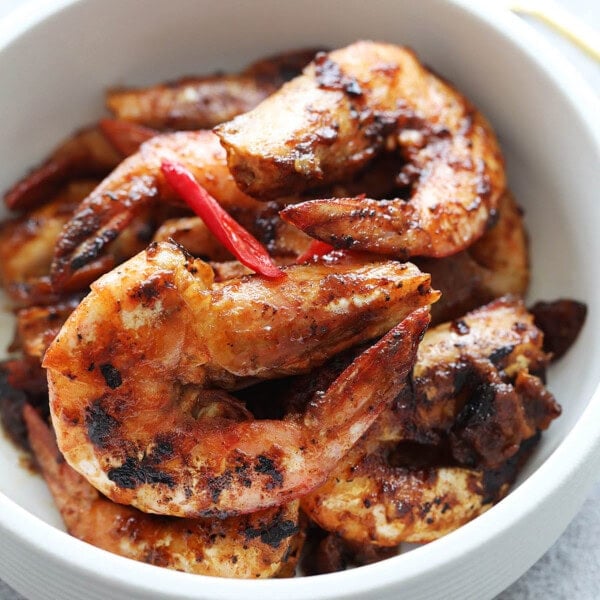
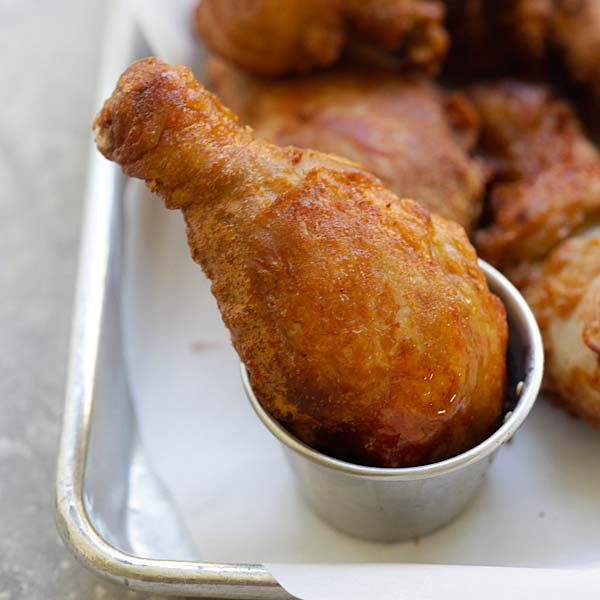
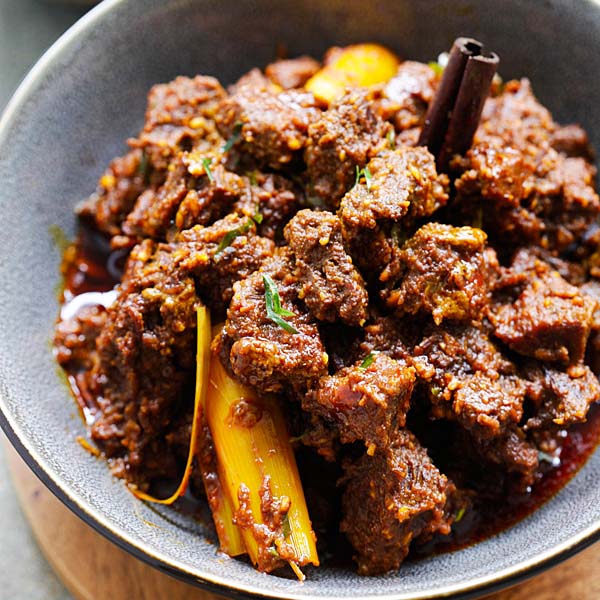
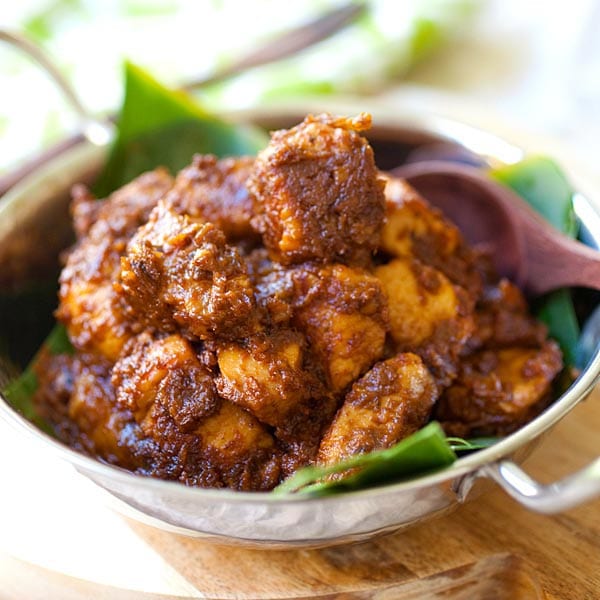






Hi – do you do soak the deseeded dried chilies in hot water before grinding? If so for how long? I always have problem grinding dried chilies (even if soaked and softened) and getting a fine consistency, because the chili skin tends to be a little hard
How much water for the rice? It just says “some”
Hey! It is amazing! I like cooking in Redmond 4500 multicooker, I think it is much better, but recipe is fantastic! But, maybe there should be another cheese? I try to experiment and find the best one.
5.6ounces of coconut milk is 165ml? Do I then add enough water to make a total of 480ml (2cups)? Same measurement as I cook my normal white rice is 2cups rice and 2cups water. :)
Also million thanks for ur awesome recipes, I am really having fun with them. :)
Hi. I wanted to know what type of dried chili’s is needed for the recipe, I used regular whole Chinese chili’s but it came nothing like the sambal you have pictured, it just mostly purple from the prawn paste TYIA
Dried red chili arbol is what I used.
nasi lemak my all time favourite :D
Hello!!!! If I want to scale up this recipe to 6 cups of rice, should I also scale up the coconut milk to 18oz? Thank you!
Yes I think so.
Nasi Lemak was my childhood breakfast on my way to school in Singapore. i remember paying just one SGD$1 for a packet of banana-leaf wrapped goodies. I do miss those times when I was just discovering the intriguing and intoxicating flavors and smells of our local cusine. I definitely have to make this to try to recapture a little of that sense of wonder.
Hi Bee,
Can you share the brand of dried anchovies you use? I’m in NYC and in the Asian market, I find the variety of brands confusing.
Thanks very much!
C
They are all the same…just choose the ones you like.
Living in a rather off-beat town in Italy, Trieste, with only 2 stores catering for Asian ingredients and the better of the 2 is closing down ai the end of this month….. !!! How I envy all of you who live elsewhere…..
My thanks and compliments to those who made this website possible,for bringing me back all those fond childhood memories of daily food fragrance wafting in the air, as Ah Foon (our amah) struggled to drag us off to the doctor, the dentist whatever….
None of the Peranakan/Nonya food I try to cook here really measures up to what my memory holds… 70 percent of the spices are substitutes… and the remaining 30 percent is genrally stale… Oh, how I envy all of you……
Hey your dishes are specifically an asian and indian style of recipes… I like the way you present the recipe…